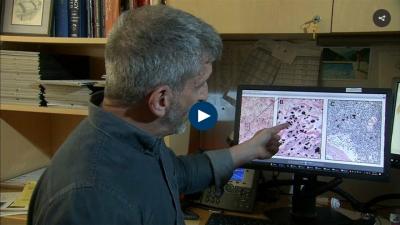It's found just below the skin's surface, surrounding arteries and veins, casing the fibrous tissue between muscles, and lining our digestive tracts, lungs, and urinary systems.
Neil Theise, a professor at NYU's School of Medicine, is author of the paper.
He believes the interstitium is a source of lymph, a fluid that moves through the body's lymphatic system and supports immunity.
He says that knowing how diseases spread through this part of the body could help researchers better understand how cancer spreads.
"Can we detect [disease] earlier by sampling fluid from the space? Can we figure out mechanisms to stop spread?"
This, he believes, could be the next direction of the research. Continue here to view the EuroNews video
| A Euronews release | || March 29, 2018 |||




